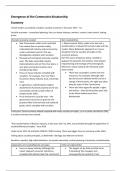Summary
Summary Essay plans for the Emergence of the Communist dictatorship topic Russian History A-level 1H.
- Module
- Breadth study (1H)
- Institution
- AQA
Essay plans for the Emergence of the Communist dictatorship topic Russian History A-level 1H. Covers the topics Politics, Opposition, Society and Economy. Essay titles from books and past papers (AS and A-level).
[Show more]



